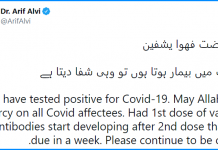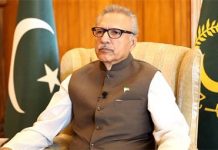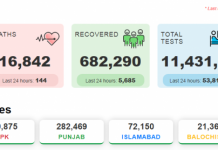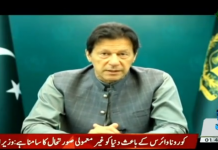ISLAMABAD, May 23 (APP): The Arms Control and Disarmament Centre (ACDC) at the Institute of Strategic Studies Islamabad (ISSI) in collaboration with the Indian Ocean Study Centre (IOSC), National Institute of Maritime Affairs (NIMA), hosted a seminar on “India’s Maritime Buildup: Implications for the Indian Ocean,” to address crucial geopolitical and security dynamics of the Indian Ocean Region.
NIMA President Vice Admiral Ahmed Saeed, in his keynote address, highlighted that the Indian Ocean Region (IOR) was crucial for global maritime trade, with around 80% of global oil trade passing through its chokepoints.
“Controlling these passages equates to significant geopolitical influence, underscoring the region’s role as a critical axis in global economic and security frameworks,” he said.
The presence of major powers in the IRO, he added, complicated the geopolitical landscape, making the region a focal point for economic advancement, strategic competition, and diplomatic engagements.
He stressed that regional cooperation and dialogue were needed to mitigate tensions and promote stability.
ISSI Director General Ambassador Sohail Mahmood, in his welcome remarks, stated that the Indian Ocean played a critical role as a vital maritime corridor, connecting nations across Africa, Asia, and Australia, and highlighted its immense geopolitical significance on a global scale.
He also elaborated on the Indian Ocean’s role as a crucial arena for diplomatic engagement and regional collaboration.
He further pointed out that controlling the Indian Ocean often equated with dominance over Asia, emphasizing its pivotal role in shaping regional dynamics.
Ambassador Sohail Mahmood highlighted the active involvement of major powers such as the United States, the United Kingdom and China and countries like Japan and India in the region, underscoring that the IOR was a focal point for economic advancement, geopolitical competition, and strategic manoeuvering.
He also dilated on India’s expanding naval capabilities, the role of Indian maritime buildup in the IOR’s militarization, and the impact of those developments on Pakistan’s security and economic interests.
ACDC-ISSI Director Malik Qasim Mustafa, who moderated the seminar, pointed out that India wanted to ensure dominance of the Indian Ocean with the help of extra-regional powers and strives to play the role of ‘Net Security Provider.’
He said India militarised the Indian Ocean while rapidly modernizing and building up its blue-water capabilities, and nuclearized it.
“This growing Indian naval presence is endangering the peace and stability of the region. It has heightened Pakistan’s threat perception and security concerns, and it could spark a conventional and nuclear arms race in the region.”
Former Vice Chief of Naval Staff Vice Admiral (R) Khan Hasham Bin Saddique elaborated on the great power competition in the IOR. He discussed the strategic significance of the IOR, and the military dimensions shaping the region’s environment.
He underscored the nontraditional challenges that accompany this competition, including piracy, terrorism, and human trafficking, which complicated the already tense maritime security landscape.
He provided a broad overview of geopolitical
tensions and underscored the need for cooperative security frameworks to address these multifaceted challenges.
Director General, Arms Control and Disarmament Affairs (ACDA), SPD, Brigadier Zahir Kazmi shared his insights on the Indian sea-based nuclear capabilities and their impact on deterrence stability. He elaborated on how India was expanding its nuclear weapons capabilities at sea, and how it could undermine regional deterrence and could potentially lead to an arms race, increasing conflict risk. India’s unconstrained military capabilities, including MIRV, hypersonic, and cruise missiles, pose threats to power.
Despite bilateral agreements, tensions persist, and India’s inadequate safety system warranted consideration, he stressed.
NIMA Vice President Baber Bilal Haider explored India’s maritime ambitions and emphasized on India’s strategic culture, which was influenced by historical and ideological factors and drives its current politics.
His analysis extended beyond security concerns to include regional stability and economic cooperation. He stressed that India’s economic strategy involved importing, managing choke points, recognizing its economic might, and establishing a strong military base in the IOR.
Rear Admiral (R) Syed Faisal Ali Shah discussed Pakistan’s ambitions and achievements in enhancing its maritime capabilities and securing its interests amidst regional challenges.
His remarks emphasized the strategic importance of the Gwadar Port and its potential to transform regional trade dynamics while also addressing the security threats posed by India’s naval buildup.
He stressed according due cognizance to the importance of maritime domain and shifting the strategic focus accordingly.
The session concluded with an engaging interactive discussion and dynamic Q&A.














